Past Fellows
Visiting Fellows 2023-2024

Daniel Cunha is interested historical capitalism, critique of political economy, critical theory, and the Anthropocene. As a Ph.D. in Sociology, M.Sc. in Environmental Science and B.S. in Chemical Engineering, his research is trans-disciplinary, making use of concepts and methods from critical political economy, historical sociology, the world-systems perspective, and the natural sciences. His dissertation on the Industrial Revolution (ca. 1760-1840) conceptualizes it as world-historical, encompassing large-scale environmental and labor regime transformations and equally world-historical social resistance. He has articles published in Mediations, The Anthropocene Review, Critical Historical Studies, Journal of the World-Systems Research, among others, and is a coeditor of Sinal de Menos. His most recent publication, “Climate Science as Counterculture”, appeared in Liinc em Revista (2022). He is preparing a book on climate science which will show how it internalizes transformed subjectivities into its concepts, as part of world-historical developments spanning from the Second World War to May 68 and beyond.

Amrita De is a postdoctoral fellow in the Center of Humanities and Information at Penn State. Her research focuses on global south masculinity studies and affect theory. Her works have been published in NORMA, Boyhood Studies, Global Humanities and are forthcoming in other edited collections. She is also working her way through her first novel centered around contemporary Indian Masculinities.

Tara Ward is a scholar of twentieth and twenty-first century art and visual culture. Her attention to the ways avant-garde artistic practices are integrated into everyday life has led to a diverse array of research interests from how the Orphist painters used color theory to understand the modern city to how the history of the nude relates to legging fashion to Instagram as an artistic practice. Deeply influenced by Foucault and ordinary language philosophy, Dr. Ward argues for a very broad definition of art and insists that the visual is as meaningful as text. Her work has been published by the Guggenheim Museum and the Oxford Art Journal, and her current book project is entitled Appreciation Post: Towards an Art History of Instagram.
Predoctoral Fellows 2023-2024
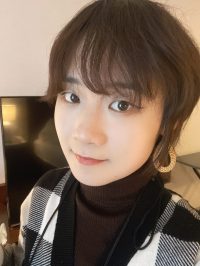
Qiyu Chen is a fifth-year PhD student in Comparative Literature with a dual-title in African Studies. Her dissertation entitled "The Making and Unmaking of African Literary Canons: Circulation, Genre, and Gender during the Cold War" examines the many alternative African literary canons formed during the Cold War beyond the most well-known postcolonial Anglophone African literary canon. Focusing on literary networks on the African continent, and other Third World locales, such as Socialist China, this project discovers routes of circulation and translation of African literature beyond the Western metropolis-(post) colony nexus. This project also brings to the fore less-studied genres (as compared to the African novel) of African literature, such as, short story, autobiography, and theater, evaluating their presentation in print materials and rethinking their relation to decolonization movements. Zooming in onto the stories of individual African intellectuals, this dissertation aims to show their agency or lack thereof when navigating the Cold War publishing infrastructure.

Héctor Linares is a third-year PhD candidate in History, specializing in Early Modern Global History, Race and Ethnicity and Latin America. His dissertation explores cases of Indigenous and Afro-descendants who successfully negotiated their socioeconomic and political status with the Spanish Crown and achieved aristocratic titles, positions and honors. He is the author of tewnty-one peer-reviewed articles and books chapters, and he has edited five books on Spanish nobility, ecclesiastical elites, and the Spanish Empire with some of the most prominent European publishers, including Silex, Doce Calles, Palermo University Press, and Brill. His research has been funded by numerous institutions, namely: the European Commission, the French Republic, the Folger Library, and the Spanish government. At Penn State he works under the direction of Drs. Ronnie Hsia and Amanda Scott. He is also serving as a member of the Diversity, Equity and Inclusion Committee at the Renaissance Society of America.

Tiyobista Maereg is a fifth-year Ph.D. candidate in Developmental Psychology minoring in Women’s, Gender, and Sexuality Studies. Her primary research interest is the role of context in the ethnic-racial identity development of Black youth, in particular, Black immigrant youth and Black girls. Her current project explores the racial and gendered messaging Black girls receive from school and social media and investigates how this messaging is recreated through the identity development process for Black girls.
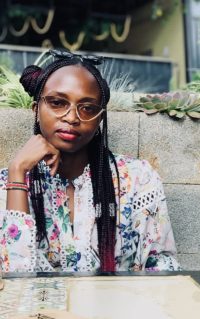
Amy Mjema Omolo is a dual-title PhD Candidate in Comparative Literature and African Studies. Her dissertation – Re-imagining Waithood: Narratives of Young Kenyans Negotiating Adulthood – interrogates the concept of waithood to explore representations of relationships, livelihoods, and socio-political critique that young people in Kenya engage in. Some of the questions she contemplates include: How are ideas of youth and waithood liminal within the context of African youth? How have youth in Kenya related with the city, the state, and the global world as they consider what it means to be an adult? How have digital platforms become spaces of resistance, solidarity, and exploration of identities? Ultimately, she asks to what extent and in what ways have/are Kenyan youth negotiating adulthood. Drawing on fields such as Popular Culture and Literature, her dissertation rejects the binary positioning of youth as either vandals or vanguards of society to explore how young Kenyans are self-fashioning adulthood within waithood.
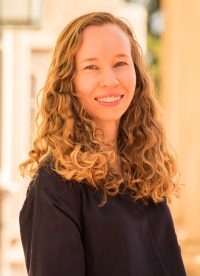
Emma Rossby is a dual-title PhD candidate in French and Francophone Studies and Visual Studies. With a focus on contemporary Belgium, her research examines how forms of visual and multimodal storytelling circulate as tools for teaching and learning outside of academic spaces. How, for instance, are bandes dessinées used as pedagogical tools by museums and other cultural institutions to mediate conversations around race, gender, and colonial histories? How do participatory art initiatives illustrate aspects of the history of urbanization and immigration in Brussels? This dissertation is grounded in on-site research in Belgium and brings together tools from visual studies and comics studies, particularly as they intersect with critical race and feminist theories.

Jasmine Norma Watson is a PhD candidate studying Latin American history and African American Studies with secondary focuses on race & ethnicity and transnationalism. Their doctoral research focuses on AfroBrazilian resistance and placemaking in the 20th century. Using a transnational Africa/Black Diasporic lens, Norma traces common struggles, strategies, and ideologies, throughout the Americas, bringing more AfroBrazilian history into Pan-African and Black international conversations. They utilize various sources like newspapers, radio broadcast, poetry and oral interviews to discuss the ways in which Black consciousness raising unfolded in intimate spaces. Norma’s research also traces AfroBrazilian women’s roles in grass roots organizing and mutual aid with the use of an intersectional lens and Black Feminist and Womanist theory.
Faculty Fellows 2023-2024
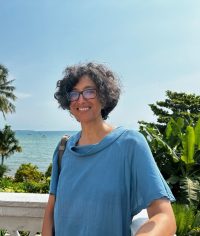
Gabeba Baderoon is an Associate Professor of Women’s, Gender and Sexuality Studies, African Studies and Comparative Literature. She co-directs the African Feminist Initiative at Penn State with Alicia Decker and Maha Marouan. Baderoon received a PhD in English from the University of Cape Town and has held Post-doctoral fellowships in the Africana Research Center and the “Islam, African Publics and Religious Values” Project. Among her honors are the Sarah Baartman Senior Fellowship at the University of Cape Town, an Extraordinary Professorship of English at Stellenbosch University, and fellowships at the African Gender Institute, the Nordic Africa Institute, the Rockefeller Centre at Bellagio and the Stellenbosch Institute for Advanced Study. Baderoon is the author of Regarding Muslims: from Slavery to Post-Apartheid, which received the National Institute for the Humanities and Social Sciences Best Non-fiction Monograph Award, and the poetry collections The Dream in the Next Body, A hundred silences and The History of Intimacy. She also co-edited the award-winning essay collection, Surfacing: on Being Black and Feminist, with Desiree Lewis. Baderoon’s work has been honored with the DaimlerChrysler Award for South African Poetry, the Elisabeth Eybers Poetry Prize, the University of Johannesburg Prize for South African Writing and three awards from the National Institute for the Humanities and Social Sciences: for Best Poetry Book, Best Non-Fiction Monograph and Best Edited Collection. The project she is working on for her CHI Fellowship is a poetic autobiography titled, "The Concussion Diaries: Relief Map of a Drifting Mind."

Cathleen D. Cahill is the Walter L. Ferree and Helen P. Ferree Professor in Middle-American History at Penn State University. Her research focuses on women’s labor and political activism. She is the author of two books, Federal Fathers & Mothers: A Social History of the US Indian Service, 1869-1933 (University of North Carolina Press, 2011) and Recasting the Vote: How Women of Color Transformed the Suffrage Movement (UNC Press 2020). She also recently co-edited the collection of essays, Indian Cities: Histories of Indigenous Urbanization (University of Oklahoma Press, 2022). She is looking forward to using her Center for Humanities and Information fellowship to explore how Black women married to US soldiers participated in national networks of communication and activism during the election of 1920. She will also be finalizing a graphic history on the transnational suffrage activism of Chinese-American women.

Rosa A. Eberly is a free-range rhetorician who studies histories and theories of rhetoric, publics theory, public memory, sound, character, and deliberation. Most recently, Eberly curated the archive of Harry Shearer’s Le Show, now in its thirty-ninth year, for the Library of Congress American Archive of Public Broadcasting. Eberly's curated exhibit was the focus of the CAS 2023 Select Summer Symposium, sponsored in part by CHI.
Since 1996 Eberly has studied and taught courses on relationships among rhetoric, violence, and public memory with emphasis on violence in and against public education. Additional interests include Isocrates and Theophrastus, free speech and democracy, rhetoric and poetics, sound and aural rhetorics, and theories of identity. Eberly is author of Towers of Rhetoric: Memory and Reinvention and Citizen Critics: Literary Public Spheres; co-editor of A Laboratory for Public Scholarship and Democracy and The Sage Handbook of Rhetoric; co-author of The Elements of Reasoning, 2d ed.; and articles on publics theory, proto-public deliberation in rhetoric classrooms, public memory, sound studies, and rhetoric and identity.
Eberly is Associate Professor of Rhetoric in the Department of Communication Arts & Sciences and the Department of English, and she directs the Intercollege Minor in Civic and Community Engagement.

Field of specialization: Mexican literature and intellectual history, Comparative Literature. PhD Yale, 1999. Before coming to Penn State, John Ochoa was Associate Professor of Spanish at the University of California, Riverside. He was awarded a Ford Foundation postdoctoral fellowship in 2001-02. His first book, The Uses of Failure in Mexican Literature and Identity (University of Texas Press 2005) studies the relationship between awareness of failure and national culture. It examines the work of several “monuments” of the Mexican canon, including Bernal Díaz del Castillo, J. J. Fernández de Lizardi, Alexander von Humboldt, José Vasconcelos, and Carlos Fuentes; it argues that the acknowledgement of failure, both historical and aesthetic, can actually be constructive and ultimately lead to both self-knowledge and self-definition.
Besides Mexican intellectual and cultural history, his other teaching and research interests include post-colonial theory, colonial Latin American literature, Chicano performance art, and, of all things, culinary history. He has published book chapters and articles on Edward Said’s debt to Foucault, on the novels of Agustín Yáñez and the end of time, and on Sor Juana Inés de la Cruz and food. He edited an anthology of work by the Mexican/Chicano poet and performance artist Guillermo Gómez Peña, Bitácora del cruce (Fondo de Cultura, 2006), and has published several studies of his work.
His current research, comparative in nature, explores American exceptionalism. It will pair readings from the United States and Latin America in order to consider claims for the uniqueness of the American condition.
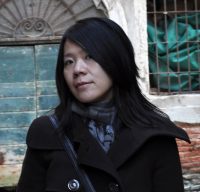
Dr. Tan specializes in Chinese, East Asian, and Asian diasporic art of the 20th and 21st century. Her research interests include global avant-gardism, public and socially engaged art, eco art and activism, vernacular photography, and museum studies. Her upcoming book The Minjian Avant-garde: : Art of the Crowd in Contemporary China (Cornell, 2023) studies how experimental artists mixed with, brought changes to, and let themselves be transformed by minjian, the volatile and diverse public of the post-Mao era, and critically assesses the rise of populism in both art and politics. Dr. Tan has published in peer-reviewed journals such as positions: asia critique, Art Journal, Diacritics, World Art, and Third Text. Her curatorial and editorial activities explore the connections between Asian and Asian American art. She currently works on two projects. One studies the intersection between photography, landscape painting, design, and theater in China and the Chinese diaspora from the 19th century to present. The other examines the tension between land ownership and contemporary eco art in the Sinophone world. Her research on these projects have been supported by the Chiang Ching-kuo Foundation and the Humanities Institute at Penn State.

Nancy Tuana is DuPont/Class of 1949 Professor of Philosophy and Women's, Gender, and Sexuality Studies at Penn State University and was the founding director of the Penn State Rock Ethics Institute. Dr. Tuana’s overarching area of expertise is feminist philosophy with a twofold emphasis: i) theoretical approaches to liberatory thought including standpoint theory, intersectionality, and anti-colonial theory and ii) the question of how to develop effective coalitional work among different theoretical frames such as Black feminisms, Indigenous feminisms, Latina/x feminisms, Asian American feminisms, trans theory, as well as attention to issues of class, dis/abilities, and environmental justice. She also works in the field of philosophy of science. A key emphasis of her recent research involves the field of climate and environmental philosophy. Her most recent book. Racial Climates, Ecological Indifference: An Ecointersectional Approach (Oxford University Press, 2023), focuses on the infusions of systemic racisms and climate injustice. Tuana has expertise in working as a member of scientific teams to address issues of adaptation to climate impacts that are attentive to the values and lifeways of those impacted. She is currently a member of the NSF grant Megalopolitan Coastal Transformation Hub (MACH) https://coastalhub.org/ which is developing a climate-resilient decision-making framework that will support coastal communities in the New York City-New Jersey-Philadelphia region and beyond as they navigate a deeply uncertain future. Her work contributes to MACH's commitment to the authentic integration of justice, equity, diversity, and inclusion into its practices.
Visiting Fellows 2022-2023

Daniel Cunha is interested historical capitalism, critique of political economy, critical theory, and the Anthropocene. As a Ph.D. in Sociology, M.Sc. in Environmental Science and B.S. in Chemical Engineering, his research is trans-disciplinary, making use of concepts and methods from critical political economy, historical sociology, the world-systems perspective, and the natural sciences. His dissertation on the Industrial Revolution (ca. 1760-1840) conceptualizes it as world-historical, encompassing large-scale environmental and labor regime transformations and equally world-historical social resistance. He has articles published in Mediations, The Anthropocene Review, Critical Historical Studies, Journal of the World-Systems Research, among others, and is a coeditor of Sinal de Menos. His most recent publication, “Climate Science as Counterculture”, appeared in Liinc em Revista (2022). He is preparing a book on climate science which will show how it internalizes transformed subjectivities into its concepts, as part of world-historical developments spanning from the Second World War to May 68 and beyond.

Amrita De is a postdoctoral fellow in the Center of Humanities and Information at Penn State. Her research focuses on global south masculinity studies and affect theory. Her works have been published in NORMA, Boyhood Studies, Global Humanities and are forthcoming in other edited collections. She is also working her way through her first novel centered around contemporary Indian Masculinities.

Tara Ward is a scholar of twentieth and twenty-first century art and visual culture. Her attention to the ways avant-garde artistic practices are integrated into everyday life has led to a diverse array of research interests from how the Orphist painters used color theory to understand the modern city to how the history of the nude relates to legging fashion to Instagram as an artistic practice. Deeply influenced by Foucault and ordinary language philosophy, Dr. Ward argues for a very broad definition of art and insists that the visual is as meaningful as text. Her work has been published by the Guggenheim Museum and the Oxford Art Journal, and her current book project is entitled Appreciation Post: Towards an Art History of Instagram.
Predoctoral Fellows 2022-2023

Heidi Biggs (they/she) is a PhD candidate in the College of Information Sciences and Technology studying Human Computer Interaction and Design. They are an interdisciplinary sustainability scholar, holding a B.A. in English Literature and a Master of Design (MDes) in interaction design from the University of Washington. Stemming from an interest in the Anthropocene Era, climate change, and queer theory, and inspired by speculative and research through design traditions, their work has used making, somatics, first-person exploration, design ethnography, and performative engagement to shift their own and other’s awareness of their ecological imbrications via aesthetic experiences with environmental or ecological data. Carrying this work forward, they look to understand the relations that emerging, intelligent data applications build (both materially and ideologically) between humans and their environment and how those mediations might be part of larger systems of power and oppression.

Jennifer Buchan is a doctoral student in the Communication Arts and Sciences department where she studies rhetorics of control and gender, especially those marked by commitments to whiteness and patriarchy. Jen's dissertation, entitled “Evitable AI: Rhetorical Speculation in the Futures of Artificial Intelligence” develops a theory of rhetorical speculation, or a theory of how speculation about humanity’s future(s) produces, shapes, and constrains public imagination and deliberation. Specifically, this dissertation assesses political, popular, and scientific discourse about the future of artificial intelligence (AI) as an archive of rhetorical speculation as they connect through common appeals to the myth of AI inevitability. “Evitable AI” understands speculation about the future of “thinking machines” as neither new nor idle but, instead, as historically repeating, strategic discourse that captures public imagination about what may be possible in and for AI and human futures.

Steven Casement is a graduate student studying Early Modern Global History with minor fields in Modern European and Environmental history. His research takes a transnational approach to diplomatic history in the British Isles, focusing on the motives that have encouraged diplomatic ties with England during the Early Modern period. His doctoral research uses the Restoration as a lens with which to understand diplomatic policy in England, focused toward Habsburg Spain in the 17th century. Using letters and treaties made between English resident ambassadors and their superiors, as well as their counterparts in Spain, his project aims to understand what forged the human links and personal relationships established through epistolary means and the medium of diplomacy, that transcended borders and national spaces during the reign of Charles II (1660-85).

Íñigo Huércanos Esparza (Pamplona, 1995) is a PhD candidate in Spanish Literature. He is currently working on his dissertation, which analyzes the manifold ways in which Spanish romantic poets reacted to the epistemological dilemmas brought about by the development of modern scientific practices and its underlying theories of knowledge (empiricism/positivism.) Covering roughly the period 1800-1850, and by means of an interdisciplinary approach combining literary studies, history of science, and philosophy, he is exploring the following questions: what are the epistemological value hierarchies of these romantic poets? That is, what forms of knowledge (objective, introspective, spiritual, artistic, social…) do they privilege, and which ones do they scorn and why? Where do Spanish romantics stand in the face of the increasing tensions between religious tradition and scientific progress? How is poetry a suitable means of expression to render these tensions?
Íñigo’s articles dealing with these and other topics have appeared in journals such as the Bulletin of Spanish Studies and Hispanófila.

Taylor Hare is a fourth-year Ph.D. Student in English. Taylor’s doctoral dissertation, entitled Reading Access: Disability and the History of the Shakespearean Text, brings book history and disability studies together to examine the various ways in which editors, printers, and publishers have defined and acted upon the principle of accessibility in the presentation of Shakespeare’s plays. By reading key Shakespearean book-objects through the lens of access, from the First Folio to the first tactile editions, this project reveals how implicit and explicit claims to access have animated the Shakesperean textual tradition from its earliest moments, and it demonstrates the importance of comparing these claims with the lived experiences of readers.
Faculty Fellows 2022-2023

Kathlene Baldanza is Associate Professor of History and Asian Studies. She is the author of Ming China and Vietnam: Negotiating Borders in Early Modern Asia (Cambridge, 2016) and co-author, with Zhao Lu, of Miscellany of the South Seas: A Chinese Scholar's Tale of Shipwreck and Travel in 1830s Vietnam (University of Washington Press, 2023). She will use the CHI fellowship to research an article on the information networks that influenced American diplomacy in Vietnam in the 19th century.

Jessica Vantine Birkenholtz is Associate Professor of Women’s, Gender, and Sexuality Studies, Asian Studies, and Religious Studies. She is a feminist scholar of religion who specializes in women, gender, and religion in Hinduism and South Asia more broadly. She has been doing research in Nepal since the early 2000s, where her work centers primarily on the construction and intersections of Hindu religious and gender ideologies, identity, and practice in and around the Kathmandu Valley. Her book, Reciting the Goddess: Narratives of Place and the Making of Hinduism in Nepal(Oxford University Press, 2018) earned the 2019 American Academy of Religion Award for Excellence in the Study of Religion. She is currently working on two projects. The first is an English translation of Nepal’s most sacred Hindu devotional text, the Svasthanivratakatha, which is supported by an NEH Scholarly Editions and Translations Grant and under contract with Oxford University Press. Her second project presents an ethnographic, intersectional study of sexual and gender minorities in Nepal that uses religion as its primary lens and attends to the intersections of religion, secularism, ethnicity, and queerness in modern Nepal. Her work has been published in Signs: Journal of Women in Culture and Society, the Journal of Feminist Studies in Religion, and the Journal of Hindu Studies, and she is co-editor of Religion and Modernity in the Himalaya (Routledge 2016).
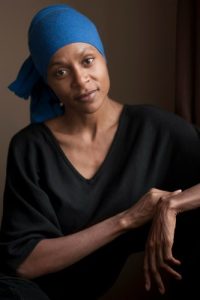
Born in France to Caribbean parents, Dr. Fabienne Kanor teaches French and Francophone Literature and Cinema. An award-winning writer and filmmaker, she has directed many movies (mostly documentaries) and published seven novels, including among others D'eaux Douces (2004), Humus (2006), and Je ne suis pas un homme qui pleure (2016). Set in Louisiana, her next novel tells the story of a Cameroonian man in search of his identity (2020).
Named by the French Minister of Culture "Chevalier des Arts et des Lettres," Kanor devotes her career to studying Race, Gender, and Migrations in France and Francophone Africa. She has just translated Zora Neale Hurston’s book Barracoon, the Story of the Last "Black Cargo" (March 2019, Lattes).
Fields : Francophone Literature (French Caribbean, Sub-Saharan Africa), Cinema (Fiction and Documentary), Post Colonial Studies, Creative Writing, Women's & Gender Studies, Caribbean & Africa Diaspora in France, Migration Studies, Body Studies.

Susanne M. Klausenis Julia Gregg Brill Professor of Women’s, Gender, and Sexuality Studies at The Pennsylvania State University. Her main areas of research are the history of fertility politics in modern South Africa, nationalism and sexuality, and transnational movements for reproductive justice. She has published articles in a range of scholarly journals including the American Historical Review, Journal of Southern African Studies, South African Historical Journal, New Zealand Journal of History, and Journal of Women's History, and is the author of two books: Race, Maternity, and the Politics of Birth Control in South Africa, 1910–39 (Palgrave Macmillan, 2004) and Abortion under Apartheid: Nationalism, Sexuality, and Women’s Reproductive Rights in South Africa (Oxford University Press, 2015). She is currently working on a monograph on the criminalization of interracial heterosex in South Africa during apartheid.

Jayoung Song is Watz Early Career Professor and Assistant Professor of Korean and Applied Linguistics. Her research focuses on Korean applied linguistics, computer-assisted language learning, intercultural communication, and second language reading, all of which she incorporates in her teaching. She has published articles in peer-reviewed journals such as Language Learning and Technology, Recall, Natural Language Engineering, and The Korean Language in America. Her articles also appear in books such as The Routledge Handbook of Korean as a Second Language and Assessing Speaking in Context. Currently, she is working on several projects regarding the effects of innovative technology such as VR and AR on second language acquisition, which are funded by U.S. Department of Education.

Ellen Stroud is Associate Professor of History at Penn State University, where she teaches U.S. Urban and Environmental History. Her first book, Nature Next Door: Cities and Trees in the American Northeast, is part of University of Washingoton’s Weyerhaeuser Environmental Books Series, and she is currently finishing her second book, an environmental history of corpse disposal in the United States. Her scholarship has been supported by the EPA, the NSF, the NEH, the ACLS, the National Humanities Center, Harvard University’s Warren Center, and the Institute for Advanced Study in Princeton, and her recent articles on the dead body project have been published in the Annual Review of Law and Social Science and Modern American History. As a CHI fellow, she is beginning work on a new project, on the challenges of measuring the natural world.
Visiting Fellows 2021-2022

Jeffrey M. Binder specializes in humanistic perspectives on computation, especially in relation to issues of language. He has written on topics ranging from the history of the back-of-the-book index to the use of technical terms in Walt Whitman’s poetry; he has also developed numerous software experiments in computational text analysis and artistic uJeffrey M. Binder specializes in humanistic perspectives on computation, especially in relation to issues of language. He has written on topics ranging from the history of the back-of-the-book index to the use of technical terms in Walt Whitman’s poetry. He has also developed numerous software experiments in computational text analysis and artistic uses of artificial intelligence. His work has been published in such journals as ELH, American Literature, and Media Culture and Society; his most recent article, “Romantic Disciplinarity and the Rise of the Algorithm,” appeared in the Summer 2020 issue of Critical Inquiry. He is currently working on a book about the history of the idea of algorithm from the sixteenth century to the rise of machine learning.
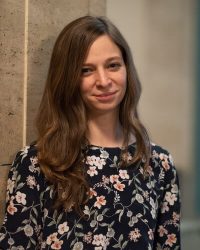
Georgia Ennis is a linguistic anthropologist specializing in media and the environment. Utilizing community-engaged and collaborative methods, her research explores Indigenous media production, language revitalization, and environmental knowledge in a changing climate. Her book-in-progress, Mothering Earth: Women, Media, and Cultural Reclamation in the Western Amazon, follows Amazonian Kichwa (Quichua) women as they mobilize media to strengthen relationships and knowledge key to environmental reclamation and food sovereignty. At the CHI, she is also developing Voices of the Amazon, a digital archive of Amazonian Kichwa media.
Predoctoral Fellows 2021-2022

My dissertation, “Encounters between Eshu and Dionysus. Afro-Greek mediations in Cuban and Brazilian theater,” inquires into the intersections of ancient Greek and African-based cosmologies and their mediations within Cuban and Brazilian performances. From the 40s up to the present, Afro-Atlantic religions such as Cuban Santería and Brazilian Candomblé have been transposed into the Cuban and Brazilian stages and interacted not only with different media and technology (theater, cinema, radio, puppetry), but also with Greek myths, dramas, and aesthetics. By dialoguing with multiple disciplines like Media and Theater Studies, Classical Reception, Race and Afro-Atlantic Studies, my project will explore the systems of mediations and structures (artifacts, technologies, and practices such as possession and ritual) involved in these Afro-Greek interactions and how they complicate important questions of Cuban and Brazilian history, such as national identity, race, gender and humanity.

My dissertation examines the role of literature in the formation of queer communities by tracing the reworking of taxonomizing language throughout the long twentieth century till now. I argue that the literary deployment of taxonomies fundamentally shifts their meaning and the social uptake of these labels in ways that bring attention to the failure of taxonomies and the communities that spring forth from this failure. This dissertation examines the poetry found in German lesbian magazines, early 20th century queer/trans novels from Western Europe, contemporary speculative fiction, and U.S. poetry slam. Engaging with and contributing to gender studies, literary studies, trans studies, fat studies, and queer studies, this project focuses on moments when lived experience and relationality escape naming and expand the possibilities of community and kinship. Through an interdisciplinary approach combining interviews, archival research, and textual and visual analysis, I contend that the unmaking and remaking of taxonomies through literature is fundamental to the work of speculative community formation—of finding, providing for, and knowing queerness, and of expanding networks of queer solidarity.

"Sonic Informatics: 'Processing' the Ethnicized Soundscape in Zimbabwean Migrant Fiction"
My project "Sonic Informatics: 'Processing' the Ethnicized Soundscape in Zimbabwean Migrant Fiction" explores the literary representation of black Zimbabwean migrants in South Africa. I employ sound as a methodology for reading contemporary Zimbabwean migrant fiction to demonstrate how migratory aesthetics engage with what I term the Ethnicized Soundscape. I argue that a sonic approach to reading and interpreting narratives of displacement challenges the treatment of sound as a supplementary effect of vision rather than as epistemology in its own right, a way of knowing. A sound-focused reading disrupts how conventional genres of migration convey information about displaced people. Processing the Ethnicized Soundscape through literary texts is the contemporary conjunction between orality and literacy. My work employs Sound Studies methodology to offer a unique way of analyzing fiction that depicts migrants' lived experiences because aurality in sub-Saharan Africa is perceived as orature; that is, the oral written down. I maintain that studying the Ethnicized Soundscape provides a broader understanding of inter-black migrant relations in South Africa. The ear, I argue, is the computational system that receives sound and makes meaning. In this context, informatics work with the ear as the computer that emits soundbites interpreted within the Ethnicized Soundscape. Sonic informatics is a new intervention that I bring to studying black African migrants' communicative practices in South Africa.

Jerome Clarke is a Ph.D. Candidate in African American Studies and Philosophy. His dissertation—Digital Colorline: Race, Machine Learning, and the Critique of Technology—reconstructs the idea of systematic racism given the germane algorithmic bias of today’s learning models. As racialization manifests as outputs of facial recognition, predictive policing, and recidivism assessment, contested notions of fairness and transparency undergird public discourse on machine auditing and design. Though debates often focus on systems that exacerbate or learn society’s racial antagonisms, scant engagement with theories of race throw little into relief and partly result in a political standstill between public-private partnerships and their critics. This project maintains that learning models disrupt common and expert notions of societal racism, political recognition, and just distribution. Conversely, certain computing frameworks obfuscate how race operates socially, and they implicate how designers, critics, and users alike understand and use learning technologies. Intervening in debates of Black Studies and Social Philosophy, this dissertation argues that the reflexive frameworks of abstraction and data positivism muddy our understanding of how, at each end of black box algorithms, stat and statistics serve as racist bludgeons.

Alexandria Herrera is a fourth-year dual-title Ph.D. Student in Latin American History and Women’s, Gender, and Sexuality Studies. Alex is currently working on her doctoral dissertation. The project examines how transnational networks of Guatemalan, American, and European doctors, public health officials, politicians, city police, and sex workers created and shaped prostitution regulations and medical knowledge about sexually transmitted infections in 19th and 20th century Guatemala City. The project focuses on the medical and public health justifications for policing sex workers’ bodies for STIs, particularly syphilis, from 1890 to 1940.

Jeff Nagel is a doctoral candidate in Penn State’s Department of Communication Arts and Sciences where he studies the intersection of absence, queerness, memory, and social movements. His dissertation, entitled “Queering Absence: The Rhetoric of the Homophile Movement,” examines key moments in American homophile activism (a direct precursor to the modern gay rights movement) and connects archival recovery with queer rhetorical theory. These moments reveal a complex relationship between queerness and absence, and the underappreciated debt modern queer organizing has to these earlier efforts. His work appears several journals including Rhetoric Society Quarterly, QED: A Journal of GLBTQ Worldmaking, and Women’s Studies in Communication.
Predoctoral Fellows 2021-2022
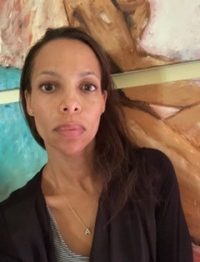
Ariane Cruz is an Associate Professor of Women’s, Gender, and Sexuality Studies. Her manuscript, The Color of Kink: Black Women, BDSM, and Pornography, is published with New York University Press. Her publications appear in journals such as differences: A Journal of Feminist Cultural Studies, Camera Obscura, Feminist Studies, Hypatia, Women & Performance, Sexualities, The Journal of American Studies, The Black Scholar, and Souls: A Critical Journal of Black Politics, Culture, and Society. Her writing also appears books such as The Feminist Porn Book: The Politics of Producing Pleasure, Black Female Sexualities, The Philosophy of Pornography: Contemporary Perspectives, Black Sexual Economies: Race and Sex in a Culture of Capital, and Women’s Lives, Multicultural Perspectives. As a scholar of black feminist sexuality theory, her research interests lie at the intersections between black female sexuality, black visual culture, and performance.

Tracy Rutler is Assistant Professor of French and Francophone Studies, and Women's, Gender, and Sexuality Studies at Penn State. She is the author of Queering the Enlightenment: Kinship and gender in eighteenth-century French literature (Liverpool University Press, 2021), and has published articles in scholarly journals such as The French Review, Criticism, and Esprit créateur. She is currently working on a second monograph, titled Careful Science: Reimagining Disability in the Early Modern Francophone World, which seeks to uncover certain healing practices that have been suppressed or erased with the rise of modern Western medicine. Turning particularly to practices of care both within France and in several early French colonies, this book will show how early modern authors, philosophers, and healers understood the capacities of the human body, and might just help us to understand how notions of (dis)ability could be understood in more adaptive and inclusive ways.

Daniel Zolli teaches and writes about late medieval and early modern European art, with particular interests in the materials and techniques of art, workshop practice, art’s theorization in oral tradition, “shop talk,” and popular folklore, and – most recently – art’s entanglements with toxicity and the environment. He is co-editor of three books: Sculpture in the Age of Donatello (D. Giles, 2015), The Art of Sculpture in Fifteenth-Century Italy (Cambridge U Press, 2020), and Contamination and Purity in Early Modern Art and Architecture (Amsterdam U Press, 2021). At the CHI, he will work on his monograph, Donatello’s Promiscuous Technique: Collaboration and Experimentation in a Fifteenth-Century Workshop.

Maha Marouan is an African feminist scholar, writer and documentarian. She is associate professor of Women, Gender and Sexuality Studies and African Studies. Her publications include Witches, Goddesses and Angry Spirits: The Politics of Spiritual Liberation in African Diaspora Women’s Fiction, (Ohio State University Press, 2013), a co-edited volume on Race and Displacement: Nation, Migration and Identity in the Twenty-First Century (University of Alabama Press, 2013) and a documentary entitled Voices of Muslim Women in the US South (Women Make Movies, New York, 2015). Her academic and creative works appeared in The Boston Review, Transition Magazine of Africa and the African Diaspora and Journal of Islamic Africa. Her research and teaching interests include, Religions and Literatures of Africa and the African Diaspora, Comparative Literature, Transnational Feminisms and Women and Immigration.
Visiting Fellows 2020-2021

Jeffrey M. Binder specializes in humanistic perspectives on computation, especially in relation to issues of language. He has written on topics ranging from the history of the back-of-the-book index to the use of technical terms in Walt Whitman’s poetry; he has also developed numerous software experiments in computational text analysis and artistic uJeffrey M. Binder specializes in humanistic perspectives on computation, especially in relation to issues of language. He has written on topics ranging from the history of the back-of-the-book index to the use of technical terms in Walt Whitman’s poetry. He has also developed numerous software experiments in computational text analysis and artistic uses of artificial intelligence. His work has been published in such journals as ELH, American Literature, and Media Culture and Society; his most recent article, “Romantic Disciplinarity and the Rise of the Algorithm,” appeared in the Summer 2020 issue of Critical Inquiry. He is currently working on a book about the history of the idea of algorithm from the sixteenth century to the rise of machine learning.

Georgia Ennis is a linguistic anthropologist specializing in media and the environment. Utilizing community-engaged and collaborative methods, her research explores Indigenous media production, language revitalization, and environmental knowledge in a changing climate. Her book-in-progress, Mothering Earth: Women, Media, and Cultural Reclamation in the Western Amazon, follows Amazonian Kichwa (Quichua) women as they mobilize media to strengthen relationships and knowledge key to environmental reclamation and food sovereignty. At the CHI, she is also developing Voices of the Amazon, a digital archive of Amazonian Kichwa media.

Jen Shook is a digital and performance dramaturg whose research and practice live at the intersection of literature, performance, media and digital humanities, Indigenous and critical race and gender studies, and cultural memory. Her book project Unghosting Tribalographies: Oklahoma-as-Indian-Territory in Performance, Print, and Digital Culture follows ritual and virtual reenactments and memorial performances in and out of the transcultural space of Indian Territory, connecting politics and policy with the print public sphere as well as to plays, poetry, and multimedia performances that borrow and revise early archives. In addition, she’s developing Instead of Redface, a digital resource amplifying contemporary Indigenous playwrights. More at http://www.jenshook.com/
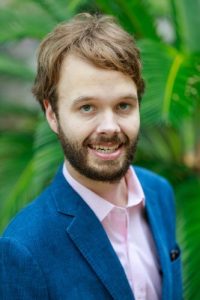
In my book project Masters of Health: Racial Science and Slavery in American Medical Schools (under advance contract with the University of North Carolina Press), I relate the untold history of how teaching racial differences and the abuse of enslaved people’s bodies became standard practices in U.S. medical education. Through an analysis of schools across the United States before the Civil War, my project argues that white, male students were indoctrinated to imagine African descended patients as suited for hard labor in the tropics, immune to the worst illnesses of slavery, and anatomically distinct from whites. This story also unfolded on a global scale, with students comparing non-white bodies from around the world in service of a global system of white supremacy. Masters of Health alsorelates select stories of those objectified by medical educators, like an enslaved rebel from Bahia, Brazil whose skulls ended up in Harvard’s anatomy museum.
Predoctoral Fellows 2020-2021

Though its primary sense refers to the flight of slaves from plantation spaces to forested and/or mountainous regions, marronage has grown in significance and meaning since the era of slavery and colonialism in Martinique. The term marronage, then, refers to a large gamut of resistance (political, cultural, memorial, or otherwise) whose dynamism renews its relevance and purchase even into the eras beyond slavery and indentured servitude. Drawing on the theoretical and poetical works of poet-philosopher Édouard Glissant, my dissertation, entitled “Tourner autour du Mahagony: Marooning poetics of Martinican literature,” explores how the dynamics of marronnage—notably flight, fugitivity, and re-membering—are taken up by a number of Martinican authors and translated into poetics that propose new, more marron articulations of Martinican (indeed, Caribbean) identity and history. The latter, like the acts of marronage that inform and inspire them, draw a portion of their animus from their relations to what Glissant calls entour, namely their natural and cultural “surroundings.” The work performed by these poetics points therefore to relational and ecological modes of being and re-membering.

Computer programming literacy is increasingly understood as vital for participation in today’s global economy, but faces significant issues of access, representation, and equity. In response to information technologies that exacerbate existing disparities of gender, race, and class, the industry of coding education designed for women and underrepresented communities is growing rapidly. My dissertation, “Programming Women: Rhetorical Education, Literacy, and Coding,” analyzes contemporary programming literacy education for women and underrepresented groups through a rhetorical study deploying a mixed-methods approach. Grounded in an intersectional feminist theoretical framework, my research seeks to understand how coding literacy is understood, taught, and practiced in these contexts. In doing so, my research has the potential to enrich the already provocative theories of the rhetoricity of code through its focus on the material, social, and digital contexts where programming is taught and made.

My dissertation project investigates a series of recent and popular commemorations of the transatlantic slave trade that frame themselves as the first of their kind. These commemorations share a commonality as texts where discourses of race, inequality, and justice are written and rewritten. Alongside their commonalities, these sites are also quite different in terms of scope and function. This dissertation will pursue answers to a series of questions concerning public memory contestation. The primary question that guides my project is, how do commemorations of the transatlantic slave trade and its legacy in the United States function in this contemporary moment of heightened, even lethal, memory dissensus?

I'm broadly interested archives as a locus for the conscious construction of early modern institutional identities. My current research involves the Society of Jesus, a Catholic religious order founded in the mid-sixteenth century. By the seventeenth century, the Society had created and instituted both detailed collection plans for their institutional archives and a robust publishing network dedicated to disseminating favorable reports of Jesuit activities around the globe. My dissertation project, currently titled "Monks, Mariners, Merchants, Murderers: The Jesuits in Seventeenth-Century Goa," examines the suspicious death of a Jesuit priest and administrator named Antonio de Andrade and the tensions between the various public and private accounts of his life and his death.

In my project, “Decoding Masculinities, Traumatic Violation, and the Legacy of French Medical Literature (1914 - 1939)," I employ critical discourse analysis of key French medical journals' written and visual publications during World War I. At the heart of the modern trend of medicalizing trauma, these scientific documents have for some time been objects of academic study; however, we often foreground our fascination with French doctors' personae without asking how contemporary masculinities, as well as their own experiences of psychological upheaval, could have fundamentally shaped their conceptualization of what trauma is. In conversation with masculinities studies like the seminal works of Robert A. Nye, Cynthia Enloe, and Iris Marion Young, I therefore interrogate the nature of WWI French medical masculinities while asking if and how masculinist discourse allowed for French doctors to express their personal trauma without exacerbating the country’s perceived crisis of masculinity.
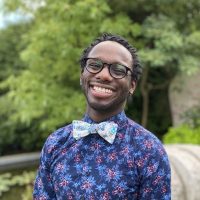
I am a dual-title PhD Candidate in the History and African American Studies departments, with a minor in Womens, Gender, and Sexuality Studies. My research focuses on the race, sexuality, incarceration, and cultural production in the twentieth century. My dissertation project focuses on lived experience, incarceration, and the networks of information and care developed during the Black Gay Cultural Renaissance. I focus on the body of published and private work of Black gay men, exploring the role of information and how their work illuminated carceral ontologies. I also work with the Center for Black Digital Research on the Social Media and Communications team.
Faculty Fellows 2020-2021

Anna is Caroline D. Eckhardt Early Career Professor and Assistant Professor of Comparative Literature. She is a scholar of Arabic literature and culture, world literature, and translation theory, as well as an active translator of Arabic texts in multiple genres. Her current book project examines the ethics of literariness in English translations of Arabic literature as a matter of literary and linguistic forms, and the embodied and affective encounters that such forms invite from a translator, reader, or critic. She is also interested in the question of how 21st-century Arabic literary prizes are reshaping the ways that the modern Arabic novel circulates in today’s world literary field. Her scholarship has appeared in Philological Encounters and the Journal of Arabic Literature, and is forthcoming from the Journal of World Literature. Her translation of Hilal Chouman’s novel Limbo Beirut was longlisted for the 2017 PEN Translation Prize and shortlisted for the 2017 Saif Ghobash Banipal Prize for Arabic Literary Translation.

Jooyeon Rhee is assistant professor of Asian Studies and Comparative Literature. Empire of Crime: Cultural Topography of Japanese Imperialism in Detective Fiction is her second book project that investigates detective fiction works that were produced mainly in colonial Korea (1910-1945). It considers detective fiction as a colonial archive since it encapsulates the paradox of colonial modernity in which the confrontation between rational and irrational, social and anti-social, order and disorder, reality and fantasy of modernity manifests in such intensity in the forms of murder, deviant sexuality, transnational economic/social mobility, etc. During her residency, Jooyeon will examine fiction penned by Japanese residents in colonial Korea by focusing on the spatial significance of crime narratives as a way to see how the writers perceived their positions and formed their identities away from the center of the empire.

Christopher Reed is Distinguished Professor of English and Visual Culture. His twelve books treat various aspects of the social significance of art and design, often in relation to literature. At the CHI, he will explore the implications of Vilém Flusser’s theories of visuality to the development of modern art and literature, starting with Nathaniel Hawthorne.

Maha Marouan is an African feminist scholar, writer and documentarian. She is associate professor of Women, Gender and Sexuality Studies and African Studies. Her publications include Witches, Goddesses and Angry Spirits: The Politics of Spiritual Liberation in African Diaspora Women’s Fiction, (Ohio State University Press, 2013), a co-edited volume on Race and Displacement: Nation, Migration and Identity in the Twenty-First Century (University of Alabama Press, 2013) and a documentary entitled Voices of Muslim Women in the US South (Women Make Movies, New York, 2015). Her academic and creative works appeared in The Boston Review, Transition Magazine of Africa and the African Diaspora and Journal of Islamic Africa. Her research and teaching interests include, Religions and Literatures of Africa and the African Diaspora, Comparative Literature, Transnational Feminisms and Women and Immigration.

Emmanuel Bruno Jean-François is Assistant Professor of French & Francophone Studies, and Comparative Literature at The Pennsylvania State University. He is the author of Poétiques de la violence et récits francophones contemporains (Brill, 2017) and has published numerous articles in scholarly journals such as the PMLA, the International Journal of Francophone Studies, Nouvelles études francophones, and Lettres romanes. Jean-François has recently co-edited a special issue of Cultural Dynamics on“The Minor in Question.” He is currently working on a second monograph, titled Indian Ocean Creolization: Empires and Insular Cultures. The project is an interdisciplinary study of creolization and networks of solidarities in the southwestern Indian Ocean; it examines how “insular” histories and cultures are contact zones that can have a direct bearing on our apprehension of larger processes within imperial dynamics.

In the wake of “color revolutions” (e.g., the Orange Revolution in Ukraine, the Purple Revolution in Iraq) as they unfolded in the streets, squares, and media platforms of the 21st century, my project, entitled Stigmaesthetics: Blood and Pixels in Multi-Media Art, endeavors to theorize the racially and politically charged topoi of the color red, specifically in the topoi of “open wounds,” “pure blood,” “contagious” or “mixed blood.” Stigmaesthetics explores, primarily in multi-media installations, artistic engagements with stigmatic wounds of racial and social and injustice from the end of the twentieth century to the present, as they perform the mixing of the technological and the corporeal both formally and aesthetically. In short, this project explores an aesthetics of rupture: the ruptures that punctuate relational networks of circulation through virtual corporealities of blood.
Visiting Fellows 2019-2020

Jeffrey M. Binder specializes in humanistic perspectives on computation, especially in relation to issues of language. He has written on topics ranging from the history of the back-of-the-book index to the use of technical terms in Walt Whitman’s poetry; he has also developed numerous software experiments in computational text analysis and artistic uJeffrey M. Binder specializes in humanistic perspectives on computation, especially in relation to issues of language. He has written on topics ranging from the history of the back-of-the-book index to the use of technical terms in Walt Whitman’s poetry. He has also developed numerous software experiments in computational text analysis and artistic uses of artificial intelligence. His work has been published in such journals as ELH, American Literature, and Media Culture and Society; his most recent article, “Romantic Disciplinarity and the Rise of the Algorithm,” appeared in the Summer 2020 issue of Critical Inquiry. He is currently working on a book about the history of the idea of algorithm from the sixteenth century to the rise of machine learning.

Georgia Ennis is a linguistic anthropologist specializing in media and the environment. Utilizing community-engaged and collaborative methods, her research explores Indigenous media production, language revitalization, and environmental knowledge in a changing climate. Her book-in-progress, Mothering Earth: Women, Media, and Cultural Reclamation in the Western Amazon, follows Amazonian Kichwa (Quichua) women as they mobilize media to strengthen relationships and knowledge key to environmental reclamation and food sovereignty. At the CHI, she is also developing Voices of the Amazon, a digital archive of Amazonian Kichwa media.

Josh Shepperd is an Assistant Professor at Catholic University and the Sound Fellow of the Library of Congress NRPB. He works on the history of emergent media industries, public humanities, sound studies, and the political economy of data and information. Josh is Director of the Library of Congress's Radio Preservation Task Force, a digital humanities consortium of 225 professors and 40 federal and public sector partnerships. His book Shadow of the New Deal: The Victory of Public Broadcasting is under contract in the University of Illinois Press History of Communication Series. It examines the institutional origins of public broadcasting and communications research in advocacy work conducted by the media reform movement. Josh is additionally under contract to co-author the official History of Public Broadcasting for the Corporation for Public Broadcasting and Current. His research has been supported by the Mellon Foundation, Rockefeller Archive, LBJ Presidential Library, Library of Congress, CLIR, NRPF, and NEH.

Jen Shook is a digital and performance dramaturg whose research and practice live at the intersection of literature, performance, media and digital humanities, Indigenous and critical race and gender studies, and cultural memory. Her book project Unghosting Tribalographies: Oklahoma-as-Indian-Territory in Performance, Print, and Digital Culture follows ritual and virtual reenactments and memorial performances in and out of the transcultural space of Indian Territory, connecting politics and policy with the print public sphere as well as to plays, poetry, and multimedia performances that borrow and revise early archives. In addition, she’s developing Instead of Redface, a digital resource amplifying contemporary Indigenous playwrights. More at http://www.jenshook.com/

In my book project Masters of Health: Racial Science and Slavery in American Medical Schools (under advance contract with the University of North Carolina Press), I relate the untold history of how teaching racial differences and the abuse of enslaved people’s bodies became standard practices in U.S. medical education. Through an analysis of schools across the United States before the Civil War, my project argues that white, male students were indoctrinated to imagine African descended patients as suited for hard labor in the tropics, immune to the worst illnesses of slavery, and anatomically distinct from whites. This story also unfolded on a global scale, with students comparing non-white bodies from around the world in service of a global system of white supremacy. Masters of Health alsorelates select stories of those objectified by medical educators, like an enslaved rebel from Bahia, Brazil whose skulls ended up in Harvard’s anatomy museum.
Faculty Fellows 2019-2020

This project examines the mass production of technical knowledge in ancient China (4th- 2nd centuries BCE). It offers the first in-depth analysis of the dynamics between Later Mohist schools that trained men in technical and proto-scientific arts and the larger intellectual and sociopolitical milieu of standardizing knowledge, especially technical knowledge, at the time. The seismic shifts occurring in the ancient world regarding the quantification and organization of knowledge mirror those occurring in our own day. I hope to use theory gained from today’s digital turn to compare, explore, and shed light on the ancient transformations in information packaging – one that had significant ramifications for the genesis of empire and technical knowledge in East Asian history.

Torture as Text/Texts of Torture: Analyzing Violence as Archive and Method in Postcolonial Uganda
In this project, I am concerned with two sets of interrelated questions. The first set considers the work that violence does for scholars (i.e. violence as archive): What does it mean to think of violence as an embodied archive? What types of data might such violence provide? How can we read torture as historical text? How is this archive gendered? The second set of questions focus on the political work of violence (i.e. violence as method): How does violence transmit information? What are the primary circuits of this information flow? What types of data are circulated through these networks? How are these circuits gendered? Taken together, these questions allow me to ascertain how violence, and information about violence, produces historical meaning. I will use this fellowship period to draft an article about violence as archive and method, as well as continue working on my latest book project, which looks at the gendered legacies of militarism in postcolonial Uganda.

"Remembering the War, Forgetting the Terror: Appeals to Family Memory in Putin's Russia."
My project examines the resurgence of the cult of the Great Patriotic War in the 2000s after its decline in the late 1980s and 1990s and the simultaneous marginalization of memories related to Stalin’s repressions. I investigate why certain constructions of collective memory stick, or have widespread internally persuasive resonance, and others seem to fade. In particular, I analyze how appeals to family memory of the war era in a variety of commemorative contexts construct an obligation to remember the past. I explore various rhetorical means of shaping public remembrance of WWII and Stalin’s repressions, including both state-sponsored “memory industry” projects and grassroots initiatives that foreground the act of memory as an obligation to one’s family.

Born in France to Caribbean parents, Dr. Fabienne Kanor teaches French and Francophone Literature and Cinema. An award-winning writer and filmmaker, she has directed many movies (mostly documentaries) and published seven novels, including among others D'eaux Douces (2004), Humus (2006), and Je ne suis pas un homme qui pleure (2016). Set in Louisiana, her next novel tells the story of a Cameroonian man in search of his identity (2020).
Named by the French Minister of Culture "Chevalier des Arts et des Lettres," Kanor devotes her career to studying Race, Gender, and Migrations in France and Francophone Africa. She has just translated Zora Neale Hurston’s book Barracoon, the Story of the Last "Black Cargo" (March 2019, Lattes).
Fields : Francophone Literature (French Caribbean, Sub-Saharan Africa), Cinema (Fiction and Documentary), Post Colonial Studies, Creative Writing, Women's & Gender Studies, Caribbean & Africa Diaspora in France, Migration Studies, Body Studies.

Title: Editorial Bodies: Perfection and Rejection in Ancient Rome
One might ascribe remarks about textual care in written verse and prose from the first centuries BCE and CE to authorial anxiety about a censorious political ethos under empire. In such conditions, polish has been read as a marker of the loss of public function and as an index of a hypersophistication devoid of utility. I contend, instead, that explicit attention to editing is more fruitfully considered a reaction to the pressures of participating in a textual culture whose participants perceived plentitude, strove toward formal perfection, and obsessed about preservation. My focus on ancient Roman textual culture promises to give greater historical texture and different theoretical inflection to assertions about our own age of information. In particular, Richard Lanham’s theory of the attention economy characteristic of high-information environments recasts rhetoric as an art of attention—but of getting it, not necessarily of holding it. For the ancient writers upon whom I focus, editing is a technique of immediacy and of longevity. By pumicing, filing, and shaving their texts, they hope to sustain attention “plus uno saeclo [beyond one generation],” as Catullus puts it.
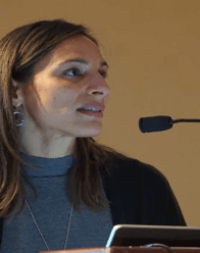
Utilizing Digital Scholarship and Collaborative Public History to Reconstruct Nineteenth Century Black Women’s Activism
The CHI faculty fellowship will support the expansion of the Anna Julia Cooper Digital Project into a major digital archive and teaching resource tentatively titled the Black Women’s Organizing Archive, with an initial focus on documenting black women’s activism from 1890s – 1920s, the critical decades surrounding the founding of the National Association of Colored Women’s Clubs (NACWC). Conceived as the first stage in a multi-year, multi-institutional project, the Cooper Digital Project will join with the Colored Conventions Project, Howard University, and Penn State University to build digital repositories and online resources documenting the complex and extended forms of black women’s activism. This initiative builds on the success of the Cooper Digital Project by utilizing community-based, digital and archival methods, as well as collaborative teams and partnerships to digitize and transcribe black women’s archives thereby helping us reconstruction a much more expansive social and intellectual history of nineteenth century black women’s writing and activism.
Graduate Student Fellows 2019-2020

A CHI Fellowship will support my dissertation, “Athenaeus’s Deipnosophistae and the Grounds of Public Discourse,” a study of the second-century CE miscellaneous reference book Deipnosophistae in its capacity to organize and circulate quotations of ancient Greek literature. Much of the information attested to in Deipnosophistae is found in no other source, making the text a valuable resource for insight into public discursive culture during the early Roman empire. The text’s complicated style and structure invites critical engagement with the content presented and stimulates the creative repurposing of that content for future discursive activity.

While many are familiar with the 1955 death of fourteen-year-old Emmett Till and his mother’s decision to publicly display his brutalized body, what is often neglected in scholarship on Till’s murder is his mother’s activism post-1955. My dissertation focuses on Till’s mother, Mamie Till-Mobley, and attempts to provide an in-depth rhetorical analysis of her public engagement by answering the following two questions: 1) How has Till’s death influenced American culture? 2) In what ways is Till-Mobley responsible for this influence? I rely on a range of methods and methodologies to argue that Till-Mobley’s intentional labor as a mother, activist, teacher, and dramatist is central for how we remember Emmett Till.

Despite a contemporary outpouring of popular and scholarly discourse on “the attention economy” and its discontents, cultural critics have scarcely considered the role of listening attention in this time of technological, economic, and social change. My project, Ambient Technologies, aims to register how collective listening practices change in tandem with shifting techno-economic conditions, from Muzak Inc.’s subtle colonization of 20th century background sound to the 21st century explosion of mobile listening devices and digital music streaming. Drawing on experimental and ambient composers like Pauline Oliveros, John Cage, and Brian Eno, I theorize a concept and practice of ambient listening. While critics of attention capitalism strive to preserve a largely visualist, individualist form of “deep attention,” I argue that ambient listening offers an alternate way forward, opening toward a diffuse, collective field of aesthetic attention.

While traditional rhetorics of science—a subfield within rhetoric and composition—unravel the logic and argumentation of scientific discourse, this project confronts the non-rational, aesthetic elements of scientific inventional practices and prose that have been ushered in by women artist-scientists to expand what can be considered rhetorical about scientific knowledge making. At stake in studying these aesthetic elements of science is a reevaluation of the limits of science and art through the inclusion of previously discounted perspectives as well as a diversification in what can be considered the elements of scientific argument. If, as has been suggested, art is a tool of science, this project argues that aesthetics is an epistemological cornerstone of scientific invention, one integral to its logic, its data, its “objectivity.”

PhD Candidate, Department of Art History
My dissertation, Carved Swahili Doors: Gateways of Status, Trade, and Transaction in East Africa, examines the fluid characteristics of regional vocabularies and networks that have existed for millennia along the eastern coast of Africa. I focus on elaborately carved doors, commissioned in the nineteenth century to adorn and define exterior spaces. Examined by style, location, patron, and audience, they functions as a form of historical documentation to elucidate symbolic and social connections across Indian Ocean and African trade routes. I aim to recover the information long held in these distinctive Swahili architecture and art forms that evolved at the center of global and cultural convergences.
Visiting Fellows 2018-2019

Jeffrey M. Binder specializes in humanistic perspectives on computation, especially in relation to issues of language. He has written on topics ranging from the history of the back-of-the-book index to the use of technical terms in Walt Whitman’s poetry; he has also developed numerous software experiments in computational text analysis and artistic uJeffrey M. Binder specializes in humanistic perspectives on computation, especially in relation to issues of language. He has written on topics ranging from the history of the back-of-the-book index to the use of technical terms in Walt Whitman’s poetry. He has also developed numerous software experiments in computational text analysis and artistic uses of artificial intelligence. His work has been published in such journals as ELH, American Literature, and Media Culture and Society; his most recent article, “Romantic Disciplinarity and the Rise of the Algorithm,” appeared in the Summer 2020 issue of Critical Inquiry. He is currently working on a book about the history of the idea of algorithm from the sixteenth century to the rise of machine learning.

I received my PhD in English from U.C. Berkeley in 2016, and I was a postdoctoral fellow at the Rutgers Center for Cultural Analysis before coming to Penn State in 2017. I’m currently at work on a book manuscript titled Modernism’s Mathematics: From Form to Formalism. That project reads literary modernism alongside a contemporaneous modernist movement in mathematics. Looking at authors such as T. S. Eliot, James Joyce, Ezra Pound, and Virginia Woolf, I argue that modernists were using mathematics to create and elucidate form—form that, in turn, engendered formalism in literary studies. Modernism’s Mathematics uses mathematical theories of syntax and semantics to understand form, arguing that formalism, as a reading practice, has structural and historical roots in mathematics.

Josh Shepperd is an Assistant Professor at Catholic University and the Sound Fellow of the Library of Congress NRPB. He works on the history of emergent media industries, public humanities, sound studies, and the political economy of data and information. Josh is Director of the Library of Congress's Radio Preservation Task Force, a digital humanities consortium of 225 professors and 40 federal and public sector partnerships. His book Shadow of the New Deal: The Victory of Public Broadcasting is under contract in the University of Illinois Press History of Communication Series. It examines the institutional origins of public broadcasting and communications research in advocacy work conducted by the media reform movement. Josh is additionally under contract to co-author the official History of Public Broadcasting for the Corporation for Public Broadcasting and Current. His research has been supported by the Mellon Foundation, Rockefeller Archive, LBJ Presidential Library, Library of Congress, CLIR, NRPF, and NEH.
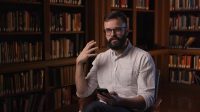
Gadgetry: A History of Techniques explores how complex information technologies like the smartphone become legible to us through everyday practice, habit, and belief. I draw on my background in literary studies to trace the many ways that small decisions by individual users add up to critical transitions between paradigms in media history, describing these moments of indeterminacy and possibility as "fictions." Digital media technologies are not a force that comes down from on high to alter patterns in human relations, they are the product of what we imagine to be possible with our tools, from the micro-level of pragmatic functionality to the macro-level of cultural imaginaries and consensus visions of the future in science fiction.
Predoctoral Fellows 2018-2019

My dissertation, currently titled “Materiality of the Myriad Things (wanwu): Commerce, Natural history, and Diplomacy in Britain and China in the eighteenth century,” focuses on the cultural and intellectual encounters through natural history, commerce and diplomacy between Britain and China in the eighteenth century. My project examines the transmission of medicinal plants, spices, and tea from China to England in the late eighteenth- to early nineteenth century, along with the cultural influence of these natural products in English society. I intend to situate the Sino-Anglo cultural and commercial exchange in a global network of knowledge circulation during this period.

My dissertation, “Writing with Cinema: Facing the Screen and Page in Modernist Spain,” interrogates how early film technology, before the advent of sound in 1927, called into question the age-old dialogue between image and text. Specifically, my project explores how the cinematic medium altered the written word in the prose fiction of modernist and avant-garde writers in Spain, inspiring a reconsideration of the form, method, and function of the literary. Cinema and the paraphernalia it generated—posters, film reviews, pamphlets, periodicals, and magazines—problematized the status of the written text and its mode of conveying meaning. I read this paraphernalia as “texts,” or rather, paratexts, to understand how the “moving picture” was mediated by a synthesis of word and image.

My dissertation project, currently titled "Congressional Town Hall Meetings: Rhetoric, Citizenship, and Participatory Democracy," examines the history and rhetorical functions of town hall meetings with congressional representatives. Using rhetorical fieldwork, I analyze town meeting practices in four different districts—OH-3, (former) PA-5, NY-19, and NH-1. Through textual analysis and interviews, I show that town meetings are a nexus point within a political community. They enable participants to contest the boundaries of that community, to reconstitute who is a legitimate part of that district, who deserves to speak, and whose stories demand recognition in larger policy narratives.

My research examines the visual politics of interwar French colonial propaganda, and the ways authorities used photography as a central tool for the attempted formation of a visual empire. I focus on the production and reception of colonial photographic propaganda to determine how state-sponsored photographs became official colonial information in the minds of many French citizens and irrefutable evidence of the civilizing mission. In my dissertation, I also examine transnational instances of photographic resistance to the French Empire in both Senegal and metropolitan France; where various photographic realities of empire coexisted.

My dissertation is about two distinct methods of textual analysis: critical and computational. Although current debates surrounding Digital Humanities and “distant reading” might lead literary scholars to believe that any relationship between computational methods and critical methods is relatively new, I trace their interpenetration back to the origins of electronic computing in the 1940s. By pairing four early computational methods of textual analysis—generative grammar, stylostatistics, content analysis, and cliometrics—with four literary intellectuals who engaged with them—Christine Brooke-Rose, J.M. Coetzee, Clarence Major, and Henry Louis Gates, Jr.—my dissertation attempts not to combine computation with critique, but to understand why we imagine them as divided in the first place.

My dissertation project draws on critical theory, feminist studies, and genre literature in order to posit the aesthetic and conceptual significance of “weird fiction,” and its legacies in the horror genre. This interstitial and speculative mode attempts to think toward the unthinkable by imagining what lies beyond human perceptual, epistemic, and phenomenological limits. It therefore engages directly with the conceptual framework of the contemporary nonhuman turn. Following the weird’s fascination with the “outside” as one of interpretive ambivalence, the project also maps the political contexts of how various media, from pulp magazines to blogs, has enabled certain gendered and racially configured reading communities and practices.

How does reading printed texts by and about Black doctors transform our understanding of American medical history, scientific racism, and the push for professionalization? So asks my dissertation, A Practice of Print: Race, Doctoring, and Medicine in Post-Bellum, Pre-Harlem Black Print Culture. Black medical professionalism was never merely about physical treatment but was instead always entangled in projects of racial uplift and the critique and reform of (extra-) medical structures. Performing what I call a Black critical medical humanism, the doctors I write about—both real and fictional—challenged prevailing discourses of African American inhumanity and ungrievability in order to promote a new kind of medicine—one that might indeed do no harm.
Faculty Fellows 2018-2019
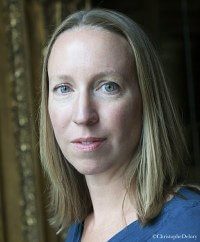
Boittin is Associate Professor of French, Francophone Studies, and History. Her research and teaching look at how colonial spaces in West Africa, Southeast Asia, and the French Caribbean were shaped by intersections between gender, race, class, and sexuality. She is the author of Colonial Metropolis: The Urban Grounds of Anti-imperialism and Feminism in Interwar Paris (2010, University of Nebraska Press), an innovative, intersectional history of radical interwar politics, and of Undesirable: Passionate Mobility and Women’s Defiance of French Colonial Policing, 1919-1952 (in production, University of Chicago Press, 2022), which tracks and maps approximately seven hundred women through French, Cambodian, and Senegalese archives to understand what ordinary people do when they realize they are being policed.

This project examines the way mental health professionals in Hiroshima, Nagasaki, as well as those who studied hibakusha in the West tackled the long term psychological consequences of the bomb. It places the various responses and clinical approaches taken in the stricken cities within the context of the larger history of trauma in Japan and elsewhere as well as the bigger historical responses of medicine to the threat and reality of nuclear weapons, tests and accidents. The project is focused on Japan but examine it within the larger context of Cold War psychiatry and research on the medical aspects of the bomb.
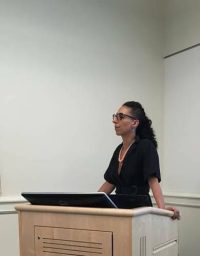
Printed Matter(s): Critical Histories and Perspectives on Maghrebi Cultural Journals investigates the cultural history of Arabic, Francophone, as well as bilingual journals from the region of the Maghreb (Algeria, Morocco, and Tunisia). The book aggregates and theorizes the periodicals that shaped the Maghreb’s cultural formations across the twentieth century. I theorize the cultural journal as a mode of knowledge production that centers on the serialized and shared dissemination of information. The book highlights not only the publications, but also the concepts, intellectuals, as well as networks of production, circulation, distribution, and readership that operated both intra- and inter-regionally. Methodologically, the interdisciplinary project weaves together media studies, cultural history, and periodical studies.

Rosa A. Eberly is a free-range rhetorician who studies histories and theories of rhetoric, publics theory, public memory, sound, character, and deliberation. Most recently, Eberly curated the archive of Harry Shearer’s Le Show, now in its thirty-ninth year, for the Library of Congress American Archive of Public Broadcasting. Eberly's curated exhibit was the focus of the CAS 2023 Select Summer Symposium, sponsored in part by CHI.
Since 1996 Eberly has studied and taught courses on relationships among rhetoric, violence, and public memory with emphasis on violence in and against public education. Additional interests include Isocrates and Theophrastus, free speech and democracy, rhetoric and poetics, sound and aural rhetorics, and theories of identity. Eberly is author of Towers of Rhetoric: Memory and Reinvention and Citizen Critics: Literary Public Spheres; co-editor of A Laboratory for Public Scholarship and Democracy and The Sage Handbook of Rhetoric; co-author of The Elements of Reasoning, 2d ed.; and articles on publics theory, proto-public deliberation in rhetoric classrooms, public memory, sound studies, and rhetoric and identity.
Eberly is Associate Professor of Rhetoric in the Department of Communication Arts & Sciences and the Department of English, and she directs the Intercollege Minor in Civic and Community Engagement.

My project addresses nineteenth-century Spiritualism as an early information technology that combined belief, affect, psychology, and media in ways that made new forms of information acceptable to a mass audience. My particular focus is on how Spiritualism retained the affective trace of interpersonal relations in the emergence of decorporealized information, ensuring that disembodied information remained experientially human. At the same time, Spiritualism naturalized the relation of information and materiality, using conventional objects to deliver information while rendering them uncanny and therefore detaching affective attachment to the materiality of information. Spiritualism intensified the authority of information, reflecting emerging informational institutions like the US Census and the Federal Postal Service, while demonstrating how, once gathered, information from the beyond was open to organization and interpretation in new modes of speculative.

Accidental Shakespeare asks what kind of information the early texts of Shakespeare’s plays preserve and transmit. TheNew Bibliographic orthodoxy of distinguishing “substantive” featuresof early editions(words) from “accidental” features(punctuation, spelling, and anything else affecting the “formal presentation” of the text) has long shaped the editing, teaching, and study of Shakespeare. By examiningthe fact and concept of textual “accident” in a variety ofpre-modern and modern contexts, this project aims to show that notionsof “Shakespeare” have always been contingent on the unintentional and extra-lexical attributes of hisplays in print.
Visiting Fellows 2017-2018
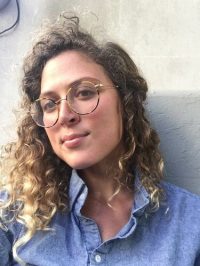
Sara J. Grossman specializes in the environmental humanities with teaching and research interests in nineteenth and twentieth-century environmental history and culture, environmental justice, disability studies, and environmental poetry. Her first book of poems is forthcoming with New Issues Poetry & Prose in 2018. She is also at work on an academic monograph titled A Natural History of Data, which is a two-century cultural history of weather data collection, computation, and archiving in the United States. She received her PhD in American Studies from Rutgers University in 2016 and holds an MFA in Creative Writing, Poetry. In the fall of 2018, she will join the Department of Environmental Studies at Bryn Mawr College as Assistant Professor of Environmental Humanities. For an updated list of projects and publications, please visit sarajgrossman.com.

I’m a historian of North America and the Atlantic World, with a focus on the intersections of European and indigenous empires over the long eighteenth century. My more general research interests revolve around communication studies, historical geography, and state formation. I am currently at work on a book manuscript, “War for the Interior,” which examines the contest for the heart of North America between 1727 and 1774. Reconstructing information circuits and their role in strengthening (and weakening) French, British, Iroquois, and Cherokee territorial claims, I combine textual and GIS methods to map the development of continental and transatlantic communications infrastructure over the long Seven Years’ War. I hold a Ph.D. from Yale University, and in Fall 2018 I'll join the Kinder Institute and Department of History at the University of Missouri as an assistant professor of History and Constitutional Democracy.

I am currently working on turning my dissertation on German conceptual artist Hanne Darboven into a book manuscript. I discuss Darboven’s calculation-based art in the context of changing perceptions of mathematics and math pedagogy in the United States and Germany in light of the Cold War, as well as the gendered history of computers, computation, and data processing. I argue that Darboven’s choice to eschew discursive language for numerical calculations is not an avoidance of subjectivity or mimicking of a depersonalized aesthetic of administration, but rather a consciously political choice, engaged with questions about the changing nature of labor, authorship, and responsibility in the information age.

Nathan Vedal (PhD, Harvard University) is a scholar of late imperial Chinese cultural and intellectual history, focusing on the history of knowledge production and history of the book. His book project, Scholarly Culture in Late Imperial China, examines broad patterns of intellectual change from the 16th through 19th centuries on the basis of the shifting methods, interactions, and practices of Chinese scholars. As a CHI fellow, he will extend this research into the cultural, material, and epistemological dimensions of knowledge production through projects on the formation of scholarly disciplines in China, as well as on the circulation of censored books in the late imperial period.
Predoctoral Fellows 2017-2018

My dissertation, “A Rhetorical History of Embodied Listening: Pedagogy, Performance, Technology,” examines and historicizes the embodied and vibrational form and effects of sonic information. In particular, my project examines the situation of classical music in the early twentieth century. While certain rhetorics of listening—like phonograph advertisements and conductor’s expectations during concerts—encouraged listeners to understand listening as an intellectual exercise, the pedagogical program of Eurhythmics taught students to listen with their entire bodies. In exploring the tensions between these listening practices as well as their resonances with the history of rhetorical education, I demonstrate that sonic information, and rhetoric more generally, necessitates a listening practice that engages the whole body.

How can individual voices at the margins of society claim the salience of a collective identity without essentializing diverse “marginal” identities or erasing the particularities of the people who inhabit them? My dissertation, currently titled “Advantageous Incapacity: Reading the Margins with Kenneth Burke,” argues that this question demonstrates the need for a more fluid semiotic model in rhetorical studies, a model theorized through Burke’s engagement with C.S. Peirce (often considered the founder of semiotics) and others. Power on the linguistic margins, I propose, often resides within the negotiated space where meaning is deliberated and in flux—a space which is not inherently central or marginal in location, but which traverses both locations.

This dissertation project, entitled Algorithmic Architects: A New Rhetorical Order, explores the effects of algorithms on political discourse and decision-making. Threading together ancient Greek rhetorical theory and posthumanism, the project characterizes algorithms as shaping worldly order through information flows and their material consequences. Algorithms are world-makers, taking an active agential role in current political tumult. Through analysis of Google bombing, copyright algorithms, and “personalized publics” on Facebook and Twitter, this project demands continued research and timely interventions regarding the immense political power of algorithms and their creators.

Parascience And Revolution: The Paranormal Mind In Twentieth-Century Literature And Science
My dissertation explores the paranormal mind as a historical, phenomenological, and epistemological concept across twentieth-century literature and science. The belief that our minds possess suprahuman capabilities like telepathy or clairvoyance has fascinated scientists, philosophers, and writers alike ever since the rise of the psychological sciences at the end of the nineteenth century, but the dominant narrative is that increased scientific scrutiny has effectively marginalized such pseudoscientific theories. My project rejects this position. Drawing primarily from post-1945 literature (particularly speculative fiction, ethnic fiction, and the occult), philosophy of science, as well as biological and physical discourse, “Parascience and Revolution” deploys the paranormal mind as a heuristic to not only follow the permutations of twentieth-century literary phenomenology but also to theorize the epistemic forces actively producing heterodox thought-forms. In arguing for the unscientific outgrowths endemic to our scientific processes, this project elevates paranormal consciousness from an esoteric nexus of study to a vital site for understanding the flow and evolution of dissident information.

A Disciplinary History and Theory of Contemporary Literature
My dissertation explores the tumultuous history of the university’s relationship with contemporary literature. I trace the constitution, production, and circulation of knowledge about contemporary literature from the first MLA panel on the subject to the formation of four key academic journals in the 1950s to the problems of research in a field wherein copyright restrictions obtain and distant reading methodologies appear necessary for a synoptic view. My project insists that the future of literary studies depends on the continued production of its object, and thus contemporary literature is the site at which our discipline must engage most urgently.

My project examines post-1945 U.S. literary history as one crucial site for understanding the culture of professional expertise—the codes, norms, and beliefs that shape intellectual labor around higher education. Following some of the ways that specialization has remade the figure of the “intellectual” in the era of knowledge work, I look to a series of writer-critics whose prose confronts the challenges of laboring within an economy driven by information. In examining the critical response to these challenges, I hope to historicize some of the broader roots of the literary humanities’ crisis discourse, an ongoing response to literary studies’ precarious place in the contemporary university.
Faculty Fellows 2017-2018

Jonathan E. Abel is a scholar of Japanese media, film, and literature. As a professor of Comparative Literature and Japanese Studies at Penn State, Abel focuses his teaching and scholarly interests on questions of global modernism, literary reception, translation studies, film studies, new media, and literary and cultural theory. He has served as director of Penn State’s Global and International Studies Program and is currently associate director of its Center for Humanities and Information. For academic year 2022-2023, he was a Woodrow Wilson Center Fellow. He is co-translator of Karatani Kōjin’s Nation and Aesthetics: On Kant and Freud (Oxford University Press, 2017) and Azuma Hiroki’s Otaku: Japan’s Database Animals (University of Minnesota Press, 2008). He has edited several volumes, including a special issue of Japan Forum entitled “Beyond Fukushima: Culture, Media, and Meaning from Catastrophe” (2015), Information Keywords a book on humanistic approaches to the study of information (Columbia University Press, 2021), and a special issue of Verge: Studies in Global Asias on “Digital Asias” (University of Minnesota Press, Fall 2021). His first book, Redacted: The Archives of Censorship in Transwar Japan (University of California Press, 2012), examined how authors and censors (under the empire and during the occupation) worked to create a particular kind of literature, full of gaps and fissures, that remains popular in Japan today. His most recent book, The New Real: Media and Mimesis in Japan from Stereographs to Emoji (University of Minnesota Press, 2023), examines how the marketing and scholarly rhetoric around new media often overlap while contradicting the actual everyday encounter of users and their new media. He develops CineMAP Japan, a project that geotags and visualizes film locations to reveal how space matter and what places mean for cinema. He is currently working on a book length study, tentatively titled Subtitling the World: Fake News and Fictional Truth, which examines microfiction posted on Twitter and Instagram as test cases for policies about tagging fake news on social media.

The literary world of pre-colonial Vietnam is not well understood. Imported and locally produced books written in literary Sinitic (Hán), the Vietnamese script Nôm, or a combination of the two circulated simultaneously. My project catalogues the imported books that were available to Vietnamese readers in the 18th and 19th centuries in order to make clear how these texts generated—or inhibited—new texts. It explores the reading practices Vietnamese readers used to process books written in a foreign language. I demonstrate that Vietnamese publishers and authors both employed tools of information management that originated in China and developed their own Nôm-based tools.

Within the records of the Freedmen’s Bureau lies a collection with the shocking title of “Murders and Outrages.” These reports trace 3,972 instances of atrocities—murders, assaults, knifings, sexual assaults, economic coercion, and assassinations of government agents—committed by southern whites against Republicans and black people in the post-Civil War South. Until now scholars have not understood the reason these data were collected and its impact on northern policy against former Confederates. This compilation proved instrumental in mobilizing Republicans to visit a hard peace that replaced civil governments in the South with military rule and led to black male suffrage and passage of the 14th Amendment.

The CHI fellowship supports completion of the final case study in my book. This chapter, tentatively titled “360° Documentary: Immersion, Apprehension, and Excessive Force,” explores the legal and sensory notion of “excessive force” in VR projects by Alejandro G. Iñárritu and Nonny de La Peña. My analysis engages questions central to digital innovations in human rights media: How does sensory immersion and user-directed movement within a virtual place connect us to others? What are the ethical challenges of this mode of documentation? In what contexts might immersive documentaries be used to cultivate “solidarity with” and not the vicarious “experience of” distant places of conflict and risk?

In the book I’m writing, Heraclitus and Knowledge, I argue, in effect, that Heraclitus (c.540–c. 480 BCE) was the first to theorize information. He does so as part of his continuous critique of Ionian research (“polymathy”), the scientific trend exemplified in his generation by Pythagoras and Xenophanes. Heraclitus argues that aiming for discovery, accumulation, and systematizing – that is, the manipulation of information – wrongly assumes that we are in a position to manipulate it. We need rather to understand ourselves first and our relationship to the world and other people. We must start by learning how to recognize.

In the seventeenth and eighteenth centuries, China was a topic of serious scholarly interest at early modern German courts. East Asia constituted a region into which German princes each hoped to expand their own agendas, though often for distinctly different reasons. I am researching scholarly and imperial networks operating within early modern Europe and across the globe. My book focuses on three stages: first, how Jesuit missionaries integrated themselves into Chinese scholarly networks; second, how information was transported between China and European centers; third, how European print media preserved information about China both through libraries and the constant republishing of the same bits of information in popular literature. My argument relies on contemporary German media theories by Friedrich Kittler, Bernhard Siegert, and Wolfgang Ernst, while also incorporating the accounts of early modern science put forward by Bruno Latour, John Law, Steven J. Harris, and other adherents of Actor-Network Theory.
Visiting Fellows 2016-2017

Sara J. Grossman specializes in the environmental humanities with teaching and research interests in nineteenth and twentieth-century environmental history and culture, environmental justice, disability studies, and environmental poetry. Her first book of poems is forthcoming with New Issues Poetry & Prose in 2018. She is also at work on an academic monograph titled A Natural History of Data, which is a two-century cultural history of weather data collection, computation, and archiving in the United States. She received her PhD in American Studies from Rutgers University in 2016 and holds an MFA in Creative Writing, Poetry. In the fall of 2018, she will join the Department of Environmental Studies at Bryn Mawr College as Assistant Professor of Environmental Humanities. For an updated list of projects and publications, please visit sarajgrossman.com.

I am currently working on turning my dissertation on German conceptual artist Hanne Darboven into a book manuscript. I discuss Darboven’s calculation-based art in the context of changing perceptions of mathematics and math pedagogy in the United States and Germany in light of the Cold War, as well as the gendered history of computers, computation, and data processing. I argue that Darboven’s choice to eschew discursive language for numerical calculations is not an avoidance of subjectivity or mimicking of a depersonalized aesthetic of administration, but rather a consciously political choice, engaged with questions about the changing nature of labor, authorship, and responsibility in the information age.

I recently completed my dissertation, "The Aesthetics of Information in Modern Chinese Literary Culture, 1919-1949," at Columbia University's East Asian Languages and Cultures Department. My research focuses on the historical and creative interconnections between the modern global communications revolution of the 19th and 20th centuries, on the one hand, and the rise of modern literature and art during China's dynamic "New Culture" period, on the other. I argue that in a variety of foreign and nativized forms, the entity of information provided China's writers critical leverage for engaging with the changing epistemology of the modern subject. Through a variety of formal experimentation and topical engagement with information, writers innovated important new modes of writing and reading, in the process aligning Chinese literature with a nascent information age. As a Fellow at the CHI, I will expand my dissertation into a book manuscript. I will concurrently pursue several ongoing "digital humanities" projects that use the quantitative analysis of textual corpora to rethink the history of literary form and the sociology of production in modern China.

Laura Helton is a historian of American and African American literature and memory from the nineteenth century to the present. Her research interests include social histories of the archive, gender and knowledge production, collections and collecting practices, print cultures of the long civil rights movement, and the making of historical narratives. She holds a PhD in history from New York University and was most recently a fellow at the Carter G. Woodson Institute for African and African American Studies at the University of Virginia. She is currently working on a book manuscript,Collecting and Collectivity: Black Archival Publics, 1900-1950, which examines the emergence of African American archives to understand how historical recuperation shaped forms of racial imagination in the early twentieth century. She is co-editor of a forthcoming issue of Social Text, “The Question of Recovery: Slavery, Freedom, and the Archive.” Her recent public humanities work includes a partnership between NYU and the Schomburg Center for Research in Black Culture that seeks to increase access to “hidden” collections. She will join the Department of English at the University of Delaware as an assistant professor of print and material culture studies in 2017.

Xiao Liu is an Assistant Professor of East Asian Studies at McGill University. Her research focuses on cybernetics, information technology and digital media, Chinese cinemas, science fiction and fantasy, and (post-)socialist media culture and critique. Her essays on cybernetics and digital media theory, melodrama and socialist politics, parody videos and information economy, and contemporary Chinese cinema are published and forthcoming in venues such as Grey Room, Differences: A Journal of Feminist Cultural Studies, Social Identities, Journal of Chinese Cinemas, Frontier of Literary Studies in China, the anthology China’s iGeneration and others. At CHI, she is completing a book manuscript, entitled Information Fantasies: Precarious Mediation and Postsocialist Imaginations in China, which focuses on the cultural practices and media imaginations around information technologies, cybernetics and systems theory in China around the turn of the 1980s. By placing this specific history in dialogue with media theory this project rethinks some key issues in current discourses of digital media.

Autumn Womack comes to CHI from The University of Pittsburgh where she is an Assistant Professor in the Department of English. Autumn's current research project, "Re-Form Vision: Race, Visuality, and Literature, 1880-1930, intersection of emergent visual technologies and African American writing in the first quarter of the twentieth century. In four case studies, "Re-FormVision" argues that writers and thinkers like Zora Neale Hurston, W.E.B. Du Bois, Kelly Miller, and Sutton Griggs treated mediums as diverse as the social survey, the reform stage, and early motion picture as sites where visual practices were (re)formed and where the limits, and possibilities, of visual technologies were tried and tested.
Predoctoral Fellows 2016-2017

My dissertation project focuses on manifestations of the Latin American historical avant-gardes and revisits archival resources to re-evaluate the impact they had on a longer timeline. I aim to display how the Latin American historical avant-gardes were re-materialized and re-purposed beyond their initial creation. To accomplish my aims, I have delimited a corpus of sources from four countries and two languages. In constructing this corpus, my project examines how avant-garde activity has been stored, archived, remembered, and transmitted and how they later were restaged and reinterpreted. I shape my corpus as a repertoire rather than an archive. Thus, the components of the corpus are not solely preserved aesthetic objects used for analysis; they become works, devices, and techniques that require social actors to be conserved and enacted.

My dissertation is a feminist rhetorical historiography of Mary Magdalene's diffuse and divergent histories of reception in antiquity, the Renaissance, and the present day. My project responds to interdisciplinary treatments of rhetoric, vision, media, gender, and sexuality. I question the relationships between canonical and heretical representations of Mary by exploring the rhetorical interplay of Mary's canonical and "heretical" depictions on papyrus and in paint. Embracing feminist calls for critical imagination, I read between the lines of the recently-discovered Gospel of Mary, and I embrace Mary's myriad representations in Renaissance, Baroque, and Contemporary painting. Mary's expansive histories of reception in both text and art inform, illuminate, and invite.

“Molecular Aesthetics: Race, Form, and Matter in Contemporary Asian American Literature” examines posthumanist aesthetics in post-1965 Asian American literature to trace racial formation at the molecular scale. Works by authors such as Ruth Ozeki, Larissa Lai, and John Yau are read through scientific discourses such as quantum physics, evolutionary biology, and disability to demonstrate how Asian American writers use both scientific and formal experimentation to contest the boundaries of the human undergirding generic expectations of ethnic literature. This project revises the emphasis on the individual subject within Asian American literary studies, unearths racial critique in works not typically read as concerned with identity, and demonstrates literature’s importance in studying racial form in an era of postracial discourse.

During my CHI fellowship, I will be at work on my dissertation project, "Drop the Subject: Ranting and Inappopriation in Contemporary American Literature." Cast as uncompromising, negative, monologic, selfish, and alienating, what’s conventionally dismissed as ranting is a form of incivility that, as a result of the limits to how aggrieved are subjects recognized, has been undertheorized. “Drop the Subject” contends that a critical engagement with rants is useful for contemporary American literary criticism exactly because it forces a re-evaluation of what occurs within the broad bandwidth of writing dismissed as expression in the discussion of identity politics. This project coordinates major flashpoints of social transgression in literature and identity politics, from the Free Speech Movement’s attempts in the late 1960s to garner support for civil rights causes on campus through tactical use of obscenity to recent controversies in poetry that reveal how identity politics in the academy is currently critically siloed, discouraging cross-pollination and engagement. A literary study of fiction and nonfiction employing the tactics of ranting pushes the acknowledged influence of political radicalism on style into writing online, where trolling and baiting tactics pull recognizable debates out of their institutionally sanctioned contexts.

My dissertation engages the memorialization of traumatic events in New Orleanian history, focusing on the movement of information along the interstices of bodies, material landscapes, and public memory. The commemorations selected for this project represent defining historical moments from New Orleans’ past: the birth of jazz, the history of enslavement, the contemporary murder crisis, and the 2005 flooding of the city. In considering various monuments and commemorative events, this dissertation will examine the ways that traumatic pasts are dredged up and transfigured in service of present needs. Borrowing from scholarship in rhetoric studies, landscape studies, and anthropology, I approach the city of New Orleans as a memoryscape; a turbulent site where specific pasts are reanimated, contested, and changed in the lived present.
Faculty Fellows 2016-2017

Socialists, suffragettes, and proponents of moral reform and gay rights transformed Germany before 1914. The rise of this radical-democratic discontent from the German Empire’s founding to the outbreak of World War I provides the basis for The Dialectics of Radical Reform in Germany, 1871-1914, my second book project. It highlights how the most important political decisions in Germany between 1871 and 1914 were reactions to the perceived threats of socialists or other proponents of radical reform. For instance, my book thus explains how Germany's policy of military brinkmanship during July 1914 was directly linked to the authorities' fears of a socialist-organized general strike for democratic reform.

In “Invisibility, Visibility and the Virtual”, Leisha Jones examines the composition, function, and membership of invisibly disabled participatory online communities, including an examination of the actualized collective sick body produced and performed in the virtual realm, and the effects it may have on the embodied individual lives of its participants. Other nodes she plans to address include the role gender may play in the assessment of sick bodies by family/friends, employers, and the medical establishment vs. online assessment by peers; the visibility of bodies with hidden maladies in the real and virtual realms; the significance of medical narrative in the diagnosis and/or treatment of illness in both traditional medical and virtual crowd-sourced communities; and the development of assessment criteria for the efficacy of digital healing.

Title: Editorial Bodies: Perfection and Rejection in Ancient Rome
One might ascribe remarks about textual care in written verse and prose from the first centuries BCE and CE to authorial anxiety about a censorious political ethos under empire. In such conditions, polish has been read as a marker of the loss of public function and as an index of a hypersophistication devoid of utility. I contend, instead, that explicit attention to editing is more fruitfully considered a reaction to the pressures of participating in a textual culture whose participants perceived plentitude, strove toward formal perfection, and obsessed about preservation. My focus on ancient Roman textual culture promises to give greater historical texture and different theoretical inflection to assertions about our own age of information. In particular, Richard Lanham’s theory of the attention economy characteristic of high-information environments recasts rhetoric as an art of attention—but of getting it, not necessarily of holding it. For the ancient writers upon whom I focus, editing is a technique of immediacy and of longevity. By pumicing, filing, and shaving their texts, they hope to sustain attention “plus uno saeclo [beyond one generation],” as Catullus puts it.

For my CHI Fellowship I will work on a data visualization application that presents multiple types of datasets. The goal is to access data more intuitively with a visual sensibility that lends itself to the qualitative process of research in the humanities, yet deploys the quantitative logic of digital language. To make this possible, I plan to develop a user-friendly interface that will include multiple visualization formats. My interest in this project has precedents in my research on data analysis for image, sound and text in direct relation to remix culture and remix studies.

My fellowship is devoted to completing my current book project, Commonplace Witnessing: Rhetorical Invention, Historical Remembrance, and Modern Public Culture, which examines how idioms of witnessing have infused the discourse of citizens, politicians, and civic institutions in recent decades. The popular appeal of such idioms allows liberal-democratic subjects to think and speak as witnesses obligated to preserve memories of past injustice or tragedy. Witnessing in modern western society represents a widely utilized source of information in the intersecting forms of historical wisdom, legal evidence, and moral persuasion. Commonplace Witnessing examines how prevalent idioms of witnessing influence the production of social meaning and value regarding the ostensible lessons of infamous historical injustices and tragedies.
Visiting Fellows 2015-2016

I recently completed my dissertation, "The Aesthetics of Information in Modern Chinese Literary Culture, 1919-1949," at Columbia University's East Asian Languages and Cultures Department. My research focuses on the historical and creative interconnections between the modern global communications revolution of the 19th and 20th centuries, on the one hand, and the rise of modern literature and art during China's dynamic "New Culture" period, on the other. I argue that in a variety of foreign and nativized forms, the entity of information provided China's writers critical leverage for engaging with the changing epistemology of the modern subject. Through a variety of formal experimentation and topical engagement with information, writers innovated important new modes of writing and reading, in the process aligning Chinese literature with a nascent information age. As a Fellow at the CHI, I will expand my dissertation into a book manuscript. I will concurrently pursue several ongoing "digital humanities" projects that use the quantitative analysis of textual corpora to rethink the history of literary form and the sociology of production in modern China.

Laura Helton is a historian of American and African American literature and memory from the nineteenth century to the present. Her research interests include social histories of the archive, gender and knowledge production, collections and collecting practices, print cultures of the long civil rights movement, and the making of historical narratives. She holds a PhD in history from New York University and was most recently a fellow at the Carter G. Woodson Institute for African and African American Studies at the University of Virginia. She is currently working on a book manuscript,Collecting and Collectivity: Black Archival Publics, 1900-1950, which examines the emergence of African American archives to understand how historical recuperation shaped forms of racial imagination in the early twentieth century. She is co-editor of a forthcoming issue of Social Text, “The Question of Recovery: Slavery, Freedom, and the Archive.” Her recent public humanities work includes a partnership between NYU and the Schomburg Center for Research in Black Culture that seeks to increase access to “hidden” collections. She will join the Department of English at the University of Delaware as an assistant professor of print and material culture studies in 2017.
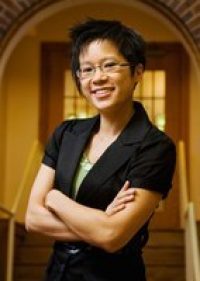
Bonnie Mak is an associate professor at the University of Illinois, jointly appointed in the Graduate School for Library and Information Science and the Program in Medieval Studies. At the Center for Humanities and Information, she will develop her book-length project, Confessions of a 21st-Century Memsahib, a critique of the digital materials with which scholarship is increasingly conducted. She will also continue her collaboration with graphic designers and librarians on a project, Designing an Argument: A Collaboration in Scholarly Publication, that tests the boundaries of scholarly publication by articulating a complex humanistic argument in the language of scientific diagrams. Mak’s research interests include manuscript, print, and digital cultures; the cultural production and circulation of knowledge; manuscript studies; book history; medieval and early modern collecting; and the history of archives and libraries. Her first book, How the Page Matters (2011), examines the interface of the page as it is developed across time, geographies, and technologies. She has been the recipient of grants from the Social Sciences and Humanities Research Council of Canada, the Andrew W. Mellon Foundation, the Newberry Consortium for Renaissance Studies, and the Huntington Library.
Predoctoral Fellows 2015-2016

My project explores the rhetorical and philosophical problems related to scale, both in the humanities and in the sciences. The aim is to address the phenomenological and hermeneutic struggles that occur when we encounter much larger or much smaller views of reality. One aspect of this encounter is the discerning of meaning on multiple scales, which first becomes apparent through information theory and biosemiotics. Scaling these kinds of informatic loops allows a reconceptualizing of the meaning of meaning and the scope of and relationship between what different kinds of discourse describe.

During my CHI Predoctoral Fellowship, I will be completing my dissertation, Assembling Contemporary Literature: On the Critical Work of Literary Art. The dissertation examines the relationship between literary practices – such as editing and publishing – and experimental aesthetics in post-WWII writing in America. Considering aesthetic positions in light of the literary practices which advocate and undermine them, and vice versa, I argue that presses and little magazines form critical assemblages that offer unusual avenues for approaching the history of contemporary literature.

The focus of my dissertation makes me very conscious, even here, of the word “I.” My research emerges from that discomfort, probing the conventions that have shaped the ways we write and read about the self in academic discourse. Beginning in the field of English studies, my self-conscious “I” investigates the different ways scholars in Rhetoric and Composition have celebrated or censured personal writing. I ask how the “personal” is defined on each occasion and what forms of speech and silence these practices create. Then drawing from other disciplines (including psychology, autobiography studies, sociology), I search for an approach to writing and critiquing autobiography that accounts for the “self” growing and changing over time, and that uses that dynamism to challenge reductive tendencies in identity-based discourse.

My dissertation project, “The Informatics of Poetry,” examines the relation between poetry and information and suggests a method of reading poetry that evolves with a consideration of how the conceptualization of information and its defining forces have shaped and continue to shape poetry, our idea of poetics, and our methods of reading. By laying out a typology of informational practices in poetry, this project aims to renew and re-engage the discourse of information and poetics. It will show, for example, how poetic form manages these practices of information (via representation, organization, transmission, and storage), and how various methods of reading and literary criticism—from formalism and structuralism to Digital Humanities approaches—have developed alongside something like “information” as literary quality.
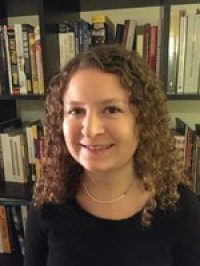
Title: Democratic Vistas: The Rhetorical Expression and Promise of Democratic Faith
My dissertation engages the messiness of information in the face of seemingly intractable difference and the unknown: why might individuals marginalized by difference – based on race, gender, or class – have faith in a more equitable or just future despite circumstances that might suggest otherwise? I analyze how marginalized collectivities in the late nineteenth and early twentieth centuries expressed a faith in the power of discourse to challenge and eventually change social injustices, a faith in agitation, and a faith in democracy itself. In particular, I examine the rhetoric and activism of Anna Julia Cooper, W.E.B. Du Bois, and Jane Addams in order to better understand the operation of “democratic faith” within marginalized collectivities in relation to traditional notions of certainty, knowledge, and evidence.
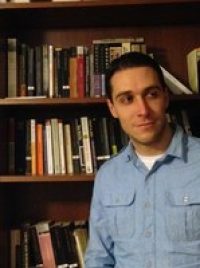
Of Minor Spaces presents a new description of the structures and dynamics of narrative geography in British fiction. Drawing on both older and newer methods of analysis, it demonstrates that spaces can be read using narratological methods commonly reserved for literary characters—that is, as oscillating hybrids of real and fictional, structural and referential significance, in a differential system of major and minor nodes. As a whole, the work shows how novelistic spaces signify in diverse, dynamic, but nevertheless mappable ways; how these geographies refract and reflect the production of socio-historical space; and how we might use these tools and the information they yield to better understand the un-typologized terrains in which we read (and live) as sites with specific latent associations yet to be named.

As television programming is increasingly accompanied by interface cues related to the collective opinion of other viewers, there is a corresponding interest regarding how such cues affect the assumptions of traditional media effects theory. The proposed dissertation will examine how social media comments that supplement television programming affects viewers’ perceptions of social reality, with a focus on how construct accessibility and bandwagon perceptions interact to affect first order and second order cultivation judgments, as informed by cultivation theory and the MAIN model.
Faculty Fellows 2015-2016
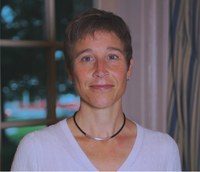
Title: From Communication Line to Data Point: The Bullet Train as Information
As the most important highway maintained by the Tokugawa Shogunate, the Tōkaidō connecting the political capital in Edo with the Imperial capital in Kyoto was a central means of information flow for centuries, even providing the foundational route for Japan’s earliest trains and wired networks. The high tech bullet train, which opened in 1964, carried mid-century information from Tokyo to Osaka along this path, but also provided a new data point by which to compare Japan to other countries and re-imagine its cities and people. This project seeks to explain the bullet train’s symbolic importance, by examining how information prompted a rewriting of identity on the level of nation, locality, and individual in a changing Japan.

Title: Radio Free Valis and Phytopsyche: Two Books on the Discursive Effectives of the Concepts and Practices of Information
During my fellowship, I will be composing two books on the discursive effects of the concepts and practices of information. Radio Free Valis: The Informatic Visions of Philip K. Dick explores writer Philip K. Dick's The Exegesis, a nearly 9000 page, mostly handwritten text inquiring into PKD's experience of being “nailed by information” now hosted on a Penn State server at Zebrapedia.psu.edu. The book excavates and explicates PKD's informatic interpretation of “nonduality” - a mode of awareness dubbed by Dick “ultra metacognition” wherein the subject perceives themselves as essentially and not accidentally as a being composed not of matter but of pure consciousness capable of being modeled by and as information. The second, Phytopsyche: Close Encounters with the Science of Plant Intelligence,explores the effects of informatic techniques and paradigms on the science of botany, where researchers have turned to the language of “plant intelligence” to articulate the networks of informational complexity they have observed using the tools of genomics and molecular biology.
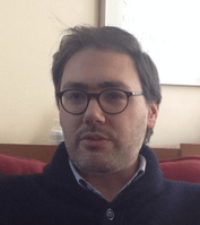
Title: A Poetics of Collecting: The Redemption of Things in German Realism and Modernism
I will be using the CHI fellowship to make headway on my second monograph, which looks to the discourses and practices of collecting to understand the precarious place of things in literary and cinematic works. I focus in particular on realist and modernist aesthetics in the German tradition and the problem of making visible or legible what is so small, fleeting, trivial, or devoid of use value that it falls below the threshold of representability. Drawing on thing theory, information theory, and ecocriticism this book thus turns from subjects to objects, from people to things, from human experience to inanimate matter in order to replace the traditional model of mimesis (imitation, reproduction of reality) with a model of collecting (accumulation, sorting and classifying of reality) as an alternative critical paradigm that is better able to come to terms with the neglected, contingent, and discarded things of the world.

Title: Collegium of Black Women Philosophers in a Digital Age
As the founding director of the Collegium of Black Women Philosophers I am committed to recruiting and retaining Black women into philosophy, archiving our significant contributions to the field, and making this ever-expanding archive available to the widest possible audience. My project, Collegium of Black Women Philosophers in a Digital Age, has three main components: 1) an enhanced interactive Collegium of Black Women Philosophers website; 2) collaboration with online encyclopedias of philosophy to feature scholarly entries on Black women philosophers; and 3) collaboration with online comprehensive bibliographies and electronic journal collections to feature the publications of Black women philosophers.
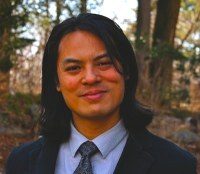
Title: Information, Knowledge, and the Pursuit of Wisdom
In studying wisdom-seeking as a cultural endeavor, I seek to describe the development of influential ‘wisdom frameworks’ over time. This study begins with a formal definition of wisdom as a holistic, transmittable program for human flourishing that derives authoritative prescriptions from a shared understanding of what is real, ultimate, and good: a program, in other words, that unites the metaphysical, the intellectual, and the ethical. I aim to see how wisdom programs were construed and enacted in Western thought and to learn, specifically, how concepts of data, information, and knowledge function within these programs.

Title: Institutions, Literacies, Technologies
My CHI project is a rhetorical study of the ways in which academic computing units mediate the teaching and learning of writing and communication in American higher education. More specifically, I conceptualize how colleges and universities structure and manage the complex universe of information technologies (IT) and provide heuristic strategies teachers can use to involve themselves in the constitution of this universe. Although academic computing units have a rich tradition of running faculty engagement programs, my argument is that humanities teachers need to contribute more directly to the technological agendas of colleges and universities, developing IT engagement programs that can have a positive bearing on students and teachers and academic institutions. There is simply too much at stake in this universe for humanities teachers not to have a voice in decision-making processes.
